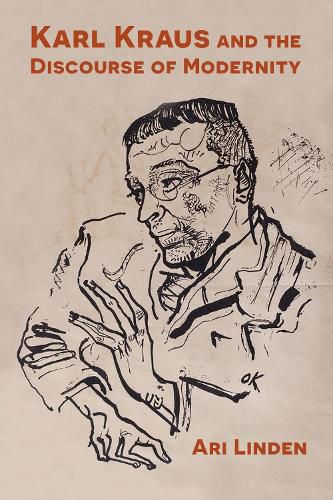Readings Newsletter
Become a Readings Member to make your shopping experience even easier.
Sign in or sign up for free!
You’re not far away from qualifying for FREE standard shipping within Australia
You’ve qualified for FREE standard shipping within Australia
The cart is loading…






Ari Linden’s Karl Kraus and the Discourse of Modernity reconsiders the literary works of the Viennese satirist, journalist, and playwright Karl Kraus (1874-1936). Linden reads Kraus’s work both on its own terms and alongside philosophy and critical theory, yielding a portrait of Kraus as an irrepressible figure in the modernist tradition. In doing so, Linden draws a more robust image of German modernism itself.
Combining close readings with intellectual history, Linden shows how Kraus’s two major literary achievements (The Last Days of Mankind and The Third Walpurgis Night) and a lesser-known play (Cloudcuckooland) address the political catastrophes of the first third of Europe’s twentieth century-from World War I to the rise of fascism. Kraus’s central insight, Linden argues, is that the medial representations of such events have produced less an informed audience than one increasingly unmoved by mass violence. In the second part of the book, Linden explores this insight as he sees it inflected in SOren Kierkegaard, Walter Benjamin, and Theodor Adorno. This hidden dialogue, Linden argues, offers us a richer understanding of the often neglected relationship between satire and critical theory writ large.
$9.00 standard shipping within Australia
FREE standard shipping within Australia for orders over $100.00
Express & International shipping calculated at checkout
Ari Linden’s Karl Kraus and the Discourse of Modernity reconsiders the literary works of the Viennese satirist, journalist, and playwright Karl Kraus (1874-1936). Linden reads Kraus’s work both on its own terms and alongside philosophy and critical theory, yielding a portrait of Kraus as an irrepressible figure in the modernist tradition. In doing so, Linden draws a more robust image of German modernism itself.
Combining close readings with intellectual history, Linden shows how Kraus’s two major literary achievements (The Last Days of Mankind and The Third Walpurgis Night) and a lesser-known play (Cloudcuckooland) address the political catastrophes of the first third of Europe’s twentieth century-from World War I to the rise of fascism. Kraus’s central insight, Linden argues, is that the medial representations of such events have produced less an informed audience than one increasingly unmoved by mass violence. In the second part of the book, Linden explores this insight as he sees it inflected in SOren Kierkegaard, Walter Benjamin, and Theodor Adorno. This hidden dialogue, Linden argues, offers us a richer understanding of the often neglected relationship between satire and critical theory writ large.